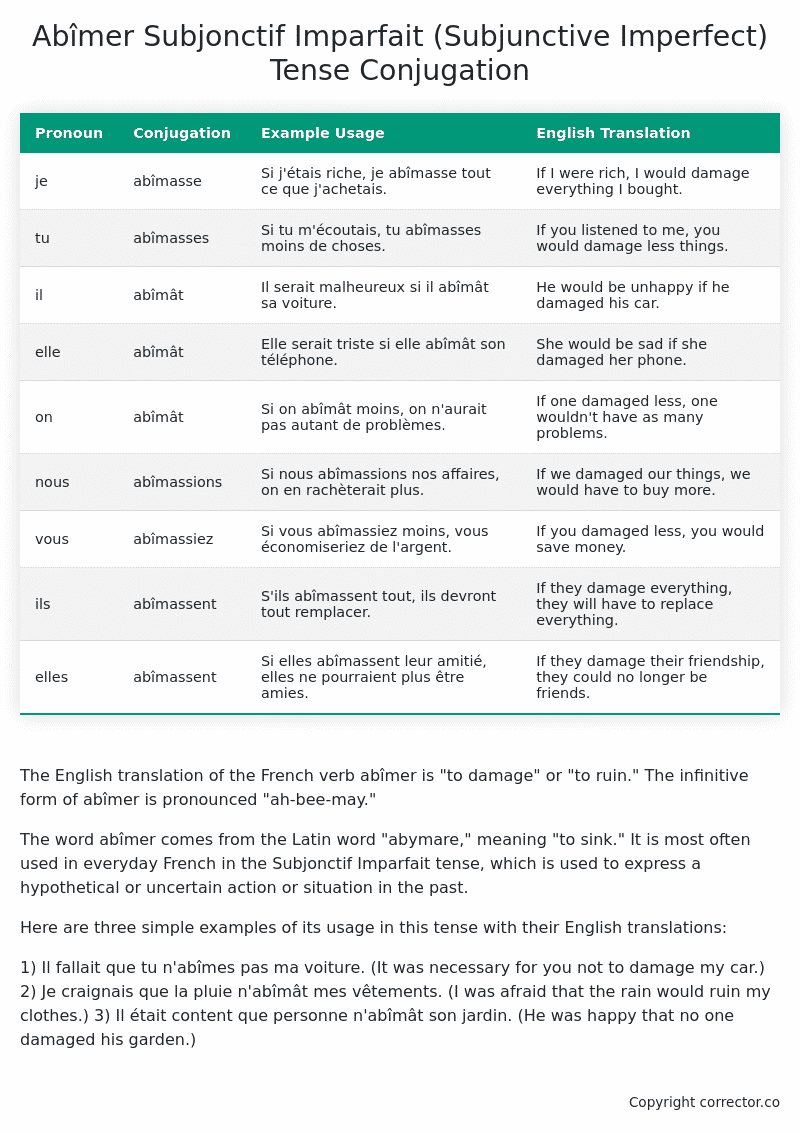Subjonctif Imparfait (Subjunctive Imperfect) Tense Conjugation of the French Verb abîmer
Introduction to the verb abîmer
The English translation of the French verb abîmer is “to damage” or “to ruin.” The infinitive form of abîmer is pronounced “ah-bee-may.”
The word abîmer comes from the Latin word “abymare,” meaning “to sink.” It is most often used in everyday French in the Subjonctif Imparfait tense, which is used to express a hypothetical or uncertain action or situation in the past.
Here are three simple examples of its usage in this tense with their English translations:
1) Il fallait que tu n’abîmes pas ma voiture. (It was necessary for you not to damage my car.)
2) Je craignais que la pluie n’abîmât mes vêtements. (I was afraid that the rain would ruin my clothes.)
3) Il était content que personne n’abîmât son jardin. (He was happy that no one damaged his garden.)
Table of the Subjonctif Imparfait (Subjunctive Imperfect) Tense Conjugation of abîmer
| Pronoun | Conjugation | Example Usage | English Translation |
|---|---|---|---|
| je | abîmasse | Si j’étais riche, je abîmasse tout ce que j’achetais. | If I were rich, I would damage everything I bought. |
| tu | abîmasses | Si tu m’écoutais, tu abîmasses moins de choses. | If you listened to me, you would damage less things. |
| il | abîmât | Il serait malheureux si il abîmât sa voiture. | He would be unhappy if he damaged his car. |
| elle | abîmât | Elle serait triste si elle abîmât son téléphone. | She would be sad if she damaged her phone. |
| on | abîmât | Si on abîmât moins, on n’aurait pas autant de problèmes. | If one damaged less, one wouldn’t have as many problems. |
| nous | abîmassions | Si nous abîmassions nos affaires, on en rachèterait plus. | If we damaged our things, we would have to buy more. |
| vous | abîmassiez | Si vous abîmassiez moins, vous économiseriez de l’argent. | If you damaged less, you would save money. |
| ils | abîmassent | S’ils abîmassent tout, ils devront tout remplacer. | If they damage everything, they will have to replace everything. |
| elles | abîmassent | Si elles abîmassent leur amitié, elles ne pourraient plus être amies. | If they damage their friendship, they could no longer be friends. |
Other Conjugations for Abîmer.
Le Present (Present Tense) Conjugation of the French Verb abîmer
Imparfait (Imperfect) Tense Conjugation of the French Verb abîmer
Passé Simple (Simple Past) Tense Conjugation of the French Verb abîmer
Passé Composé (Present Perfect) Tense Conjugation of the French Verb abîmer
Futur Simple (Simple Future) Tense Conjugation of the French Verb abîmer
Futur Proche (Near Future) Tense Conjugation of the French Verb abîmer
Plus-que-parfait (Pluperfect) Tense Conjugation of the French Verb abîmer
Passé Antérieur (Past Anterior) Tense Conjugation of the French Verb abîmer
Futur Antérieur (Future Anterior) Tense Conjugation of the French Verb abîmer
Subjonctif Présent (Subjunctive Present) Tense Conjugation of the French Verb abîmer
Subjonctif Passé (Subjunctive Past) Tense Conjugation of the French Verb abîmer
Subjonctif Imparfait (Subjunctive Imperfect) Tense Conjugation of the French Verb abîmer (this article)
Subjonctif Plus-que-parfait (Subjunctive Pluperfect) Tense Conjugation of the French Verb abîmer
Conditionnel Présent (Conditional Present) Tense Conjugation of the French Verb abîmer
Conditionnel Passé (Conditional Past) Tense Conjugation of the French Verb abîmer
L’impératif Présent (Imperative Present) Tense Conjugation of the French Verb abîmer
L’infinitif Présent (Infinitive Present) Tense Conjugation of the French Verb abîmer
Struggling with French verbs or the language in general? Why not use our free French Grammar Checker – no registration required!
Get a FREE Download Study Sheet of this Conjugation 🔥
Simply right click the image below, click “save image” and get your free reference for the abîmer Subjonctif Imparfait tense conjugation!

Abîmer – About the French Subjonctif Imparfait (Subjunctive Imperfect) Tense
Formation
Common Everyday Usage Patterns
Interactions with Other Tenses
Subjonctif Présent
Indicatif Passé Composé
Conditional
Conditional Perfect
Summary
I hope you enjoyed this article on the verb abîmer. Still in a learning mood? Check out another TOTALLY random French verb conjugation!


